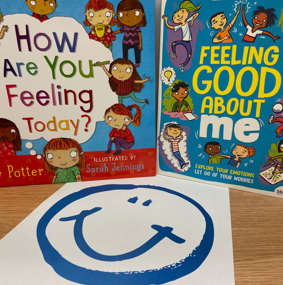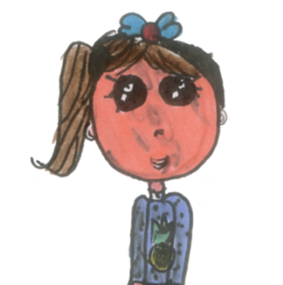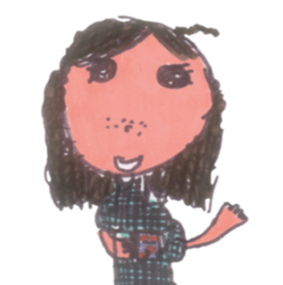Personal stories
Inspiring brighter futures
Blue Smile is dedicated to inspiring Happier Children to lead Brighter Futures.
Each and every day, our therapists support children living with mental ill health in schools right across Cambridgeshire.
Here are some of our recent personal stories of children we’ve supported.
Please note all details have been changed to protect each child’s identity.


Katie’s story
Katie, 10, had an often difficult family life, and there was ongoing conflict between adults in her life. She moved home several times and had sometimes been separated from siblings and parents. At school, Katie often seemed withdrawn and very anxious.
When Katie started 1-1 arts-based therapy sessions with Blue Smile, her therapist recognised that it was important to respect the defences Katie had developed with gentleness and care, so she created a predictable routine to help build Katie’s trust in her.
Katie started using stories, drawing and painting to process some painful memories as she became more confident in their sessions. She often wanted the therapist to sit next to her and write or draw rather than watch her. This provided a way for them to communicate that Katie was comfortable with.
As therapy progressed, Katie began to form more positive relationships with peers and adults, showing more confidence in herself and trust in others. She became less anxious and was more open to sharing her feelings and experiences.
Aaron’s story
As a young carer, Aaron, 10, felt different from his peers. His teacher was concerned that he was struggling to concentrate and seemed weighed down by pressures in his home life.
Aaron started weekly 1-1 arts-based therapy with Blue Smile. He enjoyed mixing paints together and enjoyed the process of creating art more than the end result. His therapist encouraged Aaron to enjoy the sensory experience of painting without any judgement or guidance.
Over time, Aaron became more open with his therapist, sharing more directly about home and school life. She helped Aaron understand his own emotions and those of his peers, providing useful tools to help him build and maintain positive and healthy relationships with other children and adults.
As therapy progressed, Aaron became more confident in trusting others and formed new friendships. He started to express his feelings and preferences… Aaron started to believe that he mattered!
For the first time, Aaron started to look forward to the transition to secondary school and the opportunities it would bring.


Amy’s story
Amy, 8, was very anxious at school and seemed to be withdrawing from friends. She told her teacher that she often felt unsafe at home, hiding under her bed when her older sibling got angry. The school and Amy’s mother felt it would be helpful for her to see a Blue Smile therapist.
When Amy started coming to weekly therapy sessions, she seemed particularly drawn to the sand tray. She began to move the sand around to make her own environment and chose figures to represent her family members and friends, using the sand to express her feelings about her home life. She would often put her sibling on one side of a mountain and her and her mum together on the other side.
Over the weeks, her therapist helped Amy begin to process feelings of fear, anxiety and sadness concerning her sibling. Amy’s self-confidence increased and she began to talk to her mother and her sibling about how the situation at home was affecting her. At school, she said she felt happier and asked to start a new group activity with her friend. At the end of Amy’s sessions, her mother said she felt she’d got her daughter back.
Jacob’s story
Jacob, 10, started to struggle with his mental health when his parents separated. He found it hard to come to terms with the changed circumstances and having less time with his dad, leading to frequent emotional outbursts. At school, he was anxious and lacking in confidence. Jacob was referred to Blue Smile to help build his confidence.
When Jacob started 1-1 arts-based therapy, he was reluctant to talk about his feelings. But as he built a trusting relationship with his therapist, he started to explore the difficult feelings around the separation of his parents through art and play. When playing simple board games, he would also come up with interesting and imaginative new rules to challenge his therapist, which gave him a sense of pride in his creative abilities.
With his therapist’s support, Jacob gained confidence in expressing his feelings, having fewer outbursts. At school, he was less anxious and at home, his relationship with his mum improved. More confident in expressing himself now, he was also able to tell his dad that he wanted to spend more time with him.


